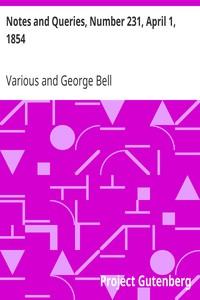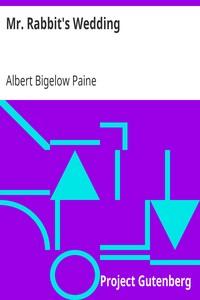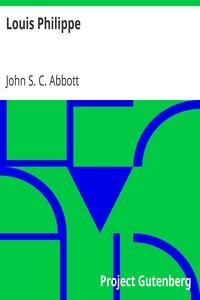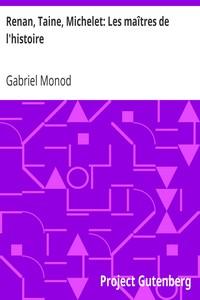Read this ebook for free! No credit card needed, absolutely nothing to pay.
Words: 27611 in 6 pages
This is an ebook sharing website. You can read the uploaded ebooks for free here. No credit cards needed, nothing to pay. If you want to own a digital copy of the ebook, or want to read offline with your favorite ebook-reader, then you can choose to buy and download the ebook.


: The Trial of Reuben Crandall M.D. Charged with Publishing and Circulating Seditious and Incendiary Papers &c. in the District of Columbia with the Intent of Exciting Servile Insurrection. Carefully Reported and Compiled from the Written Statements of the
Washington, in the District of Columbia, were lawfully authorized to hold slaves as property, and many of them did so hold them--and that many free persons of color also reside in the District; and that the defendant, unlawfully, maliciously, and seditiously, contriving and intending to traduce, vilify, and bring into hatred and contempt, among the citizens of the United States, the laws and government of the United States in the county of Washington as duly established and in force, and to inflame and excite the people of the United States to resist and oppose and disregard the laws and Government aforesaid, and the rights of the proprietors of slaves in the said county, and to inflame and excite to violence, against the said proprietors of the said slaves, not only the ignorant and ill disposed among the free people of the United States and the free persons of color in the said county, but also the slaves; and to produce among the said slaves and free persons of color, insubordination, violence, and rebellion, and to stir up war and insurrection between the said slaves and their said masters, published the said libels, containing among other things divers false, malicious and seditious matters, of and concerning the laws and Government of the United States in the said District, and of and concerning the citizens of the United States holding slaves in the said District, and of and concerning the said slaves and free persons of color, and their labor, services, and treatment, and the state of slavery in the said District.
The defendant pleaded not guilty.
The counsel for the defence here contended, that this was not sufficient evidence of malicious publication. The delivery to King was no more than simple possession in the eye of the law, and was compatible with entire innocence; and possession alone was no offence.
The question was here raised and argued by the counsel on both sides, whether any evidence could be given of any libels, except those of which the publication was proved, unless they referred distinctly to the libels charged in the indictment.
There are five counts in the indictment charging, in various ways, the publishing by the traverser of sundry libels with intent to create sedition and excite insurrection among the slaves and free blacks. The first count in the indictment charges the publication of a certain libel, not otherwise described or set out in the count, than by selecting certain paragraphs in the supposed libellous pamphlet, and setting them out severally in the count. To this count only and to the libellous matter charged thereon has any evidence of publication been given. The Attorney for the United States has moved the court to be permitted to give in evidence to the jury other printed pamphlets of the same character and on the same subject, and which the traverser acknowledged to represent his sentiments, as evidence of malice on the part of the traverser in the publication of the libel in the first count; the libel in the first count being one of those which, with the others now asked to be given in evidence, the traverser acknowledged contained his sentiments.
That is, that it is competent to prove malice in the publication of one libel by others found in the possession of the traverser on the same subject, of which no proof of publication has been offered. The motion to admit the said alleged libellous pamphlets in evidence has been supported by no precedent or adjudged case, but from analogies drawn from proceedings in other cases, and from the expediency or necessity of punishing the enormous crime of which the defendant stands accused; enormous, we all admit the crime to be, if substantiated, but which judges cannot punish but under the rules and principles of law. Enormous as the offence is, it is questionable whether from public considerations it is not better that the accused should escape punishment, than that the law should be perverted to obtain his conviction.
Again: if the proof of malice in the publication of the charged libel be not complete, can it be made so by the production of other pamphlets or libels not published? Is it an inference of law, that having such libels in the traverser's possession furnishes any proof of malice in the publication of the charged libel? I question the legal logic of such an argument. It was almost as easy to publish by distributing fifty pamphlets as one. Now if but one of fifty was given out, is it not as probable that he did not desire to publish them, as that he did? Now an inference from facts, or acts, is matter of law, and I should hesitate to tell the jury that the traverser having in his possession fifty other libels, or any lesser or greater number, which he might have published with the same ease as he published one, is proof of malice in publishing that one. An inference to be drawn from proved facts or circumstances is something like a corollary drawn from a previously demonstrated theorem in mathematics.
I wish it was as certain and clear. An inference deduced from a proved theorem in geometry is unquestionable. Every body will agree to it. An inference drawn by law from previously proved facts or circumstances, is doubtful at best. Two discreet judges may and often do disagree in regard to it. Do we not hear every day, in this court, of the most wise and able judges--of the venerated Hale himself--admonishing courts and juries not to lend a willing ear to them; at least against circumstantial evidence, which is the same thing. How many almost irresistable cases of inferences drawn from pregnant facts have been shown, in which time proved the fallacy of such inferences, and that many an innocent man has been consigned to an ignominious death by circumstantial or inferential evidence, and still so strong were the facts and circumstances in the very cases cited by them, , that under the same circumstances I should permit the same evidence to go to the jury--but in the case before the court those admonitions are well worth considering. We are asked to admit certain pamphlets said to be of similar libellous tendency, and proved by the confession of the traverser to coincide with his opinions, as the one charged in the indictment, and of the publication of which evidence has been offered to the jury, although such pamphlets were never out of the possession of the traverser nor shown to any one, to prove malice in the traverser in the publication of another pamphlet charged to have been published by him in the first count in the indictment. I do not distinctly see the legal inference of malice in having in his possession those unpublished pamphlets. He could have published them, if this malice was in his heart. Why did he not? Is it not in evidence that when he permitted one of those pamphlets to be taken from his counter and read by Mr. King, that he did it with reluctance, and that he was warned of the danger of bringing such writings so far South? Is it unreasonable to suppose that he was deterred by the warning? Taking then the whole evidence together, although it proved great indiscretion in the traverser, and great guilt had he propagated his writings--and that he would have deserved the most condign punishment had he had the temerity to have published them--yet, if I am to take the whole of the testimony in the case, I should be compelled to say, that in withholding the other pamphlets from the view of others, or of any other, he was influenced by the counsel he had received, and was afraid to publish them; and that, under the circumstances in which he permitted the first pamphlet to be taken from his counter and published, if such permission be a publication, that he then was aware of the danger he was in, and that under such circumstances the having in his possession other pamphlets of a similar character, , it cannot be made so by having other pamphlets of similar tendency in his possession, which he did not publish nor attempt to publish.
It was contended, among the reasons assigned by the Attorney for the United States for the admission of those pamphlets in evidence to the jury, that some three or four of them were endorsed with the words "read this and circulate," in the handwriting of the traverser, and this was evidence of malice in the publication of the pamphlet charged in the first count, and of which evidence of the publication has been offered to the jury. But this pamphlet last spoken of had also the same words written on it: whatever evidence of malice may be inferred from these words, is furnished by the said pamphlet itself, and therefore it is not necessary to resort to other sources for such evidence. It is true that a multiplication of the same inscriptions on other pamphlets may, and do, manifest greater zeal, and more intense interest in the subject matter of the writings, and indicate an intention on the part of the writer of such inscriptions to publish them. The malice which the law denounces is in the publication, not in the writing or composition: a man may express his thoughts or opinions in writing with impunity, and is as innocent in the eye of the law as if they were locked up in his own mind. Is not an indication or manifestation of an intention to publish certain writings or printed compositions, and the withholding the execution of such intention as strong evidence of change of purpose from fear of the consequences or for other reasons, as of malice in the publication of one of them in the way, and under the circumstances, in which the one charged to have been published in the first count was published? It is very clear, it seems to me, that if there were no other evidence of any other publication of any of the pamphlets in question, than the inscription on the corner "read this and circulate," that the indictment could not be sustained, because such inscriptions, if the pamphlets are never shown to any other person, is in the eye of the law harmless. If, then, we are asked to admit such inscriptions or pamphlets never shown to, or seen by any other person within this District, because there is evidence that one such pamphlet was permitted to be seen and partly read by another, must we not look at the evidence which proves such exhibition of such pamphlets, and connect that with such inscriptions on other pamphlets not published, to see how far such inscriptions go to fortify and strengthen the evidence of malice as to the published pamphlets? In other words, to see what legal inferences of additional evidence such inscriptions afford? If this were a case of ordinary importance, I should say without much hesitation, that they afford no such inferences. It is for the jury to draw inferences of guilt or malice from circumstances; they are fully competent to do so in the present case from the evidence now before them; but it is often and almost always a nice point for a court to instruct a jury from what circumstances or facts inferences of guilt or malice may be drawn. It is saying, Gentlemen of the jury, such and such a circumstance, if proved to your satisfaction, is evidence from which you may and ought to find against the traverser. It satisfies our minds and ought to satisfy yours. But juries ought and will judge for themselves in criminal cases; and I have always thought it a delicate matter in criminal cases, to give such instructions to juries. Here we are not asked to give an instruction; but we are asked to permit evidence to go the jury, which, if allowed, carries with it the opinion of the court that such evidence affords inference of malice. I must see such inference pretty clear myself, before I give my sanction to the jury to draw such inference themselves. It is true the law denounces any published writing having a tendency to produce a breach of peace, or insurrection, or to jeopardize the general rights of property, whether the intent of the writer was wicked or innocent, as libellous. The writing itself being of a libellous character, is of itself evidence of malice in the publication, and it would be no excuse for the publisher to say, I meant no harm, I thought I was doing good. In the eye of the law he is as guilty as if this intention was really wicked. This is called implied malice, in the absence of any other proof of malice than what is offered by the internal evidence of the writing itself. Now the object of the motion to lay before the jury other libellous papers, can be for no other purpose than to prove express malice; for the published libel charged in the first count, if it contain libellous matter, and was published, is of itself, sufficient proof of implied malice, and if it be not libellous, no other libellous writing can be introduced to make it so. Then, if it be libellous itself, it implies malice; and if other similar writings be introduced to prove malice, what does it amount to but proving the implied malice of one libel by the implied malice of other libels? Or, if it be said that some evidence of express malice has been laid before the jury, can you make this evidence more strong or clear by evidence of implied malice, contained in other similar writings not published? Upon the whole, I do not distinctly see, under all the circumstances of this case, how the unpublished writings can be admitted to prove the implied malice to be gathered from them if they had been published, the implied malice in the libel charged and allowed to have been published, or how such evidence of implied malice in them, can be brought to prove express malice in the publication of the charged libel in the first count. I am against the motion.
After arguments which occupied nearly the whole of Saturday, in which the counsel on both sides displayed great learning and ingenuity,
Witness then stated that he found the Anti-Slavery Reporters in the office. Did not recollect any others in the office, except the newspapers. The other tracts, together with some books, were found in his trunk at the house. Crandall did not say all the papers came in the box. Did not endeavor to elicit any confessions from Dr. Crandall, and, in fact, reminded him that he and Mr. Jeffers might be called on as witnesses. Witness recollected that, during the examination, there was a paper produced by Dr. Crandall, who was too much agitated to read it. One of the magistrates attempted to read it, but don't know whether it was read or not. Dr. Crandall was much agitated. There was a great excitement outside the jail, and much alarm in it. Dr. Crandall was arrested on the 10th, and examined on the 11th of August.
Well, if it please the Court, continued Mr. Robertson, my impression was, at the time, that Dr. Crandall's reply amounted to this--that he was for abolition, without regard to consequences. Mr. Jeffers asked the Doctor if he did not think that abolition would produce amalgamation and also endanger the security of the whites. The doctor did not object to these consequences. He thought the negroes ought to be as free as we were.
Free books android app tbrJar TBR JAR Read Free books online gutenberg
More posts by @FreeBooks

: Notes and Queries Number 231 April 1 1854 A Medium of Inter-communication for Literary Men Artists Antiquaries Genealogists etc. by Various Bell George Editor - Questions and answers Periodicals Notes and Queries


: Mr. Rabbit's Wedding Hollow Tree Stories by Paine Albert Bigelow Cond J M Illustrator - Animals Juvenile fiction






